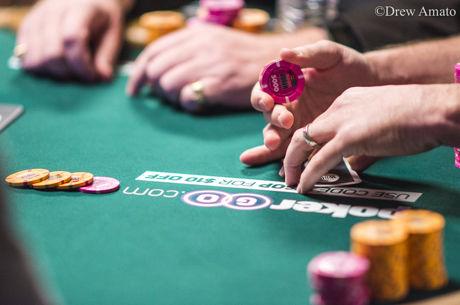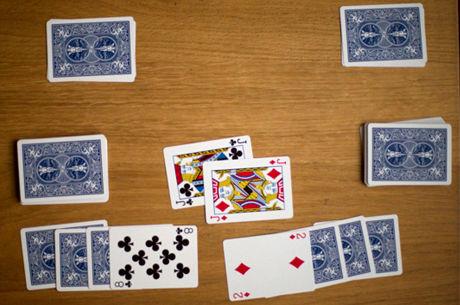Learning When (and How) to Change Gears in Poker

I find it useful when teaching poker concepts to use analogies from other activities. In this column we'll draw from the world of bicycle riding.
I started bike riding when I was fairly young — about eight. That was when most of us rode very simple bicycles with just one speed, raised handle bars, a relatively fat and cushioned seat, and a foot brake that worked by pressing backwards.
This bike was heavy, with wide tires and a welded metal frame. But it was sturdy and reliable. Since our terrain was relatively flat, this simple one-speed bike easily satisfied the job of going to and from school or to a friend's house.
As I got older I took an interest in more serious and challenging riding. I decided I wanted to join the group of high school kids who went on long and sometimes overnight trips over more varying terrain. Though I could still use my one-speed bike, I would have to stand up on the bike for hills to exert the extra pressure on the pedals required to move it uphill.
For these trips, my heavy, basic, one-speed bike was inefficient. What was called for was a serious upgrade to a bicycle we called a "ten-speeder" or racing bike.
The many "speeds" or "gears" provided a huge leap in productivity. Rather than having to slow my RPMs when I hit a hill, I could change speeds so my RPMs stayed relatively the same. This proved much more efficient, allowing me to bike much further and faster with less energy. This was also helped by the fact that these multi-speed bikes were lighter and more aerodynamic.
There was one disadvantage, at least at first. While the one-speed bike was durable and simple, seldom requiring any repair save for fixing a flat tire, the racing bike had more finely tuned equipment such as hand brakes and the mechanism for changing gears called a "derailleur" that often got out of adjustment and had to be regularly fixed.
Fairly quickly, however, I developed the bike repair acumen necessary to keep my more finely tuned bike in top shape all the time. After a short period of adjustment I never wanted to go back to the one-speed clunker. No one did.
When you're starting out in poker and playing at the lowest stakes against the worst opponents, it's best to stick to "one speed." Focus on learning a tight-aggressive style of play, which means folding all of the weaker starting hands and playing strong starting hands aggressively. It also means being cautious with flops, turns, and rivers that may very well diminish the relative power of your holding.
This style of play works best for these games because your opponents are unlikely to be good enough to notice your style of play or to exploit it by changing what they do at the table. Any advanced moves — like changing your style of play — would be wasted on them.
But as you progress and start playing in public rooms and/or play poker online against better players, you'll want the many speeds necessary for the varying "terrain" or different game conditions you'll be facing. You'll need to learn how to adjust your style of play depending on your situation. That is to say, you'll need to learn how to change gears.
Here's a simple example. You've been playing for an hour or so against the same players. They've been mixing it up regularly but you have had terrible starting cards, and have folded just about every single time even before the flop hit.
In your home game playing for pocket change or in a tiny tournament, your opponents may not have even noticed. But here in the local card room, even the worst of your opponents will have pegged you as a rock. If you continue in the game, when you do finally get a decent hand, you'll be unlikely to get any action as everyone will know that you only play the strongest starting hands. They'll fold to any raise as if you were playing your cards face up.
It's for this reason that you might want to consider changing gears by loosening up and broadening your range. Try raising with some speculative hands. Consider floating an early position raiser and then reraising his bet on the flop, even with very little. In short, go from tight-aggressive (TAG) to loose-aggressive (LAG) or even loose-passive.
Similarly, if you have been getting hit by the deck or gotten away with a few successful steals and you think that people might be getting wise to your loose style, you might consider tightening back up and only playing strong hands aggressively. The idea is to stay a step ahead of your opponents' perception of your style. Just when they are figuring out what you're doing, you want to switch it up to keep them off balance.
It's important as you change gears like this that you not become so engaged in the game of confusing your opponents that you lose sight of playing a fundamentally solid poker game.
I remember sweating a friend in a $2/5 game. He had absorbed some terrible losses and was stuck for about $2,000 or so after only a couple of hours. He took a break and started telling me that he had his opponents just where he wanted them — completely bewildered by his play.
I think he was right about that, because his play sure had me bewildered. I reminded him that just because he was playing in an unorthodox way, that didn't mean that he was going to get their money. Nevertheless, he remained completely unpredictable for the next three hours — and managed to lose another $2,000 in the process.
Just like when upgrading bicycles to travel more challenging paths, so, too, does changing gears in poker require getting used to, as well as some extra effort. The key to changing gears is to do it in a way that doesn't undermine your essentially solid play. In that sense, you don't mind if your opponents all agree on their observation that you are, overall, a winning player!
Ashley Adams has been playing poker for 50 years and writing about it since 2000. He is the author of hundreds of articles and two books, Winning 7-Card Stud (Kensington 2003) and Winning No-Limit Hold'em (Lighthouse 2012). He is also the host of poker radio show House of Cards. See for broadcast times, stations, and podcasts.
Photo: "," Vincent Battez, .









